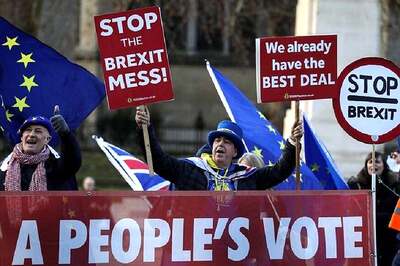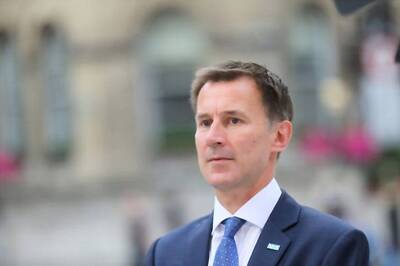
views
Washington: The International Monetary Fund on Saturday underscored the need to resolve existing trade tensions and also supported reforms of the World Trade Organisation to improve its functioning.
"Free, fair, and mutually beneficial goods and services trade and investment are key engines for growth and job creation," the IMF said in a communique issued at the conclusion of the annual meeting of the Fund and the World Bank here.
A strong international trading system with well-enforced rules addressing current and future challenges would support global growth. To this end, we recognize the need to resolve trade tensions and support the necessary reform of the World Trade Organisation to improve its functioning, it said.
The IMF said it will cooperate to reduce excessive global imbalances through macroeconomic and structural policies that support sustainable global growth.
Stressing on the importance of timely, full, and consistent implementation and finalization of the financial sector reform agenda as soon as possible, the Fund underscored the ongoing evaluation of the effects of these reforms.
We will also address fragmentation through continued regulatory and supervisory cooperation, adapt financial regulation to structural changes and the evolving global financial landscape, and close data gaps, it said.
The IMF said it is working towards a modern and globally fair international tax system, particularly taxation related to digitalization, and will address harmful tax competition, artificial profit shifting, and other tax challenges.
We will continue to address correspondent banking relationship withdrawal and its adverse consequences. We will also continue to tackle sources and channels of money laundering and terrorism financing, proliferation financing, and other illicit finance, the communique said.
The IMF said it will continue to work together to enhance debt transparency and sustainable financing practices by both debtors and creditors, public and private; and strengthen creditor coordination in debt restructuring situations, drawing on existing fora.
Noting that sustained joint action is essential to address other challenges that transcend borders, the global finance body said it support efforts toward achieving the 2030 Sustainable Development Goals (SDGs) and will continue to support domestic and multilateral efforts to address, build resilience to, and deal with the macroeconomic consequences of pandemics, cyber risks, climate change and natural disasters, energy scarcity, conflicts, migration, and refugee and other humanitarian crises.
It will continue to collaborate to leverage financial technology while addressing related challenges.
The global growth, the IMF said, is projected to pick up next year, but the outlook is highly uncertain and subject to elevated downside risks.
These include trade tensions, policy uncertainty, and geopolitical risks, against a backdrop of limited policy space, high and rising debt levels, and heightened financial vulnerabilities. Other longstanding challenges also persist, it said.
Strong fundamentals, sound policies, and a resilient international monetary system are essential to the stability of exchange rates, contributing to strong and sustainable growth and investment, the IMF said.
Flexible exchange rates, where feasible, can serve as a shock absorber. We recognize that excessive volatility or disorderly movements in exchange rates can have adverse implications for economic and financial stability. We will refrain from competitive devaluations and will not target our exchange rates for competitive purposes, it said.
Advancing structural reforms to lift growth, employment, and productivity; enhance resilience; and promote inclusion, the IMF reaffirmed its commitment to strong governance, including by tackling corruption.
Noted the lack of progress on a quota increase under the 15th Review, the IMF reaffirmed its commitment to build a strong, quota-based and adequately resourced body to preserve its role at the centre of the global financial safety net.
It called on the Executive Board to complete its work on the 15th Review and on a package of IMF resources and governance reforms, and to report to the Board of Governors as soon as possible.




















Comments
0 comment